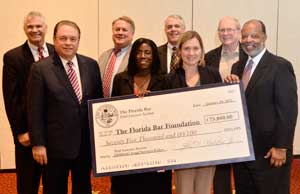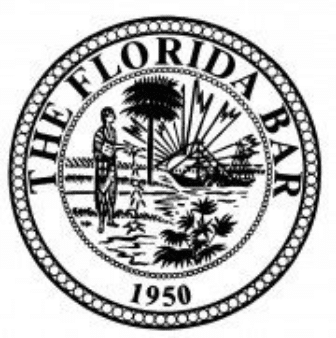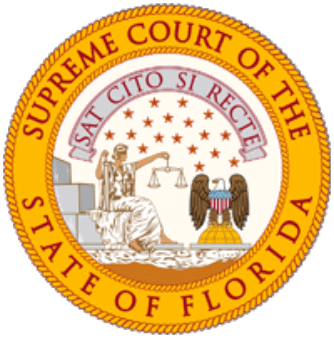by Nancy Kinnally
January 2012

ORLANDO, Fla. — The Trial Lawyers Section of The Florida Bar Jan. 26 announced a $75,000 charitable gift to The Florida Bar Foundation for a Trial Lawyers Children’s Legal Services Fellowship.
Subject to approval by the Foundation’s Legal Assistance for the Poor Grant Committee and its board of directors at the organization’s March 15-16 meeting, Jessica Rae of the Community Law Program in St. Petersburg will be The Florida Bar Trial Lawyers Children’s Legal Services Fellow. Rae, a graduate of the Washington College of Law at American University, will be serving children through the Transitioning Dependent Youth Project, which represents about 30 to 40 needy children a year.
Kimberly Rodgers, executive director of the Community Law Program, called the gift from the Trial Lawyers section “the most magnificent gesture of support for the importance and impact this project has had in the lives of vulnerable children in Pinellas County since we started it in 2007.”
“We are so thankful to the Trial Lawyers Section and to the Florida Bar Foundation for making it possible for us to continue this work,” Rodgers said. “And with Jessica’s help, I am confident we will be able to help even more children aging out of foster care get better prepared to live on their own.”
The gift will support a children’s legal services attorney position that was subject to elimination due to a sharp decline in revenue from Florida’s Interest on Trust Accounts (IOTA) program, the chief funding source for The Florida Bar Foundation. The Trial Lawyers Section indicated that it might make the gift for one or two additional years.
“The Trial Lawyers Section recognizes the vital role Foundation-funded children’s legal services attorneys play in protecting the rights of low-income children,” said Craig Gibbs, chair of the Trial Lawyers Section. “We were alarmed when we learned of the potential loss of career children’s legal services attorneys due to the slump in IOTA revenue, and we wanted to do our part by enabling one of the Foundation’s grantees to retain its children’s advocate.”
Since the early 1990s, the Foundation has funded special annual grants for legal services to children. The Foundation’s priorities for its Children’s Legal Services Grant Program include representation of foster-care children and access to special education, medical, developmental and mental health services that are required under law.
The Foundation distributed $2.8 million to 23 legal aid programs through its Children’s Legal Services Grant Program in 2010, but had to cut those grants by 21 percent in 2011 after low interest rates brought about an 88 percent drop in annual IOTA revenue since 2008. The Foundation used funds from its reserve to prevent even deeper cuts. But with reserve funds running low and interest rates not expected to rise until 2013 or later, the Foundation anticipates that it will have to cut its total children’s legal services grant funding to $1.2 million by 2013. This will represent further cuts to the program of 42 percent over three years.
Paul Doyle, director of the Foundation’s Legal Assistance for the Poor Grant Program, estimates these additional cuts will result in the loss of 10 to 12 attorneys out of a current 29 children’s advocates at legal aid organizations around Florida. This will in turn result in a 40 percent reduction in the number of children being served, which translates to 750 fewer children than the nearly 1,900 served in 2010.
Maria Henderson, president-elect of the Foundation and chair of its Legal Assistance for the Poor Grant Committee, expressed gratitude on behalf of the Foundation and its grantees for the leadership and generosity of the Trial Lawyers Section.
“When you look at these numbers and recognize that each one represents a Florida child with real-life problems that only an attorney can solve, it really brings home the impact of this incredible gift from the Trial Lawyers,”
Henderson said. “We are so very grateful to them, and we hope that others — whether individuals or groups — will follow their lead.”
Doyle is hoping to use the gift from the Trial Lawyers and possibly others to prevent the loss of some of the state’s most effective children’s advocates, particularly those employed by smaller legal aid programs that are least capable of absorbing the loss of grant funds and therefore most likely to eliminate their children’s legal services projects altogether.
“A big concern we have is that once these attorneys and projects are gone, they may never come back,” Doyle said. “But if we can preserve them for two or three years until IOTA revenue rises again, we might be able to save these children’s legal services projects from extinction.”




